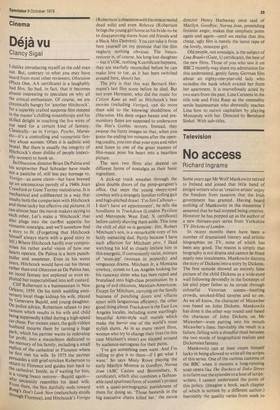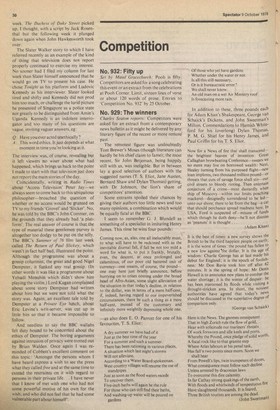Television
No access
Richard lngrams Some years ago Mr Wolf Mankowitz retired to Ireland and joined that little band of émigré writers who as 'creative artists' enjoy the freedom from taxation that the Irish government has granted. Having heard nothing of Mankowitz in the meantime I assumed that he had stopped being creative. However he has popped up as the author of a new thirteen-part series from Yorkshire TV Dickens of London.
In recent months there have been a number of dramatised literary and artistic biographies on TV, none of which has been any good. The reason is simply that biography is not drama and cannot be fitted neatly into instalments. Mankowitz distorts the story of Dickens into a story by Dickens. The first episode showed an entirely false picture of the child Dickens as a wide-eyed waif following devotedly in the footsteps of his pied piper father as he strode through colourful Victorian scenes—bustling crowds, smoked-filled taverns and so on. As we all know, the character of Micawber was based on John Dickens. Mankowitz has done it the other way round and based the character of John Dickens on Mr Micawber—even putting into his mouth Micawber's lines. Inevitably the result is a failure, falling with a dreadful thud between the two stools of biographical realism and Dickensian fantasy.
Mankowitz can at least count himself lucky in being allowed to write all the scripts of this series. One of the curious customs of the BBC when it mounts a long-running soap opera like The Duchess of Duke Street is to farm out the episodes to a host of scriptwriters. I cannot understand the point of this policy. (Imagine a book, each chapter of which is written by a different author.) Inevitably the quality varies from week to week. The Duchess of Duke Street picked up, I thought, with a script by Jack Rosenthal but the following week it plunged down again when John Hawkesworth took over.
The Slater Walker story to which I have referred recently as an example of the kind of thing that television does not report properly continued to exercise my interest. No sooner had I filed my column for last week than Slater himself announced that he would go on TV to present his case. He chose Tonight as his platform and Ludovic Kennedy as his interviewer. Slater looked tired and shifty and Kennedy did not prod him too much, or challenge the lurid picture he presented of Singapore as a police state not greatly to be distinguished from Amin's Uganda. Kennedy is an indolent interrogator and too many of his questions are vague, inviting vaguer answers, eg: Q: Have you ever acted unethically ?
A: This word ethics. It just depends at what moment in time you're looking at it.
The interview was, of course, revealing but it left viewers no wiser about what had happened, which brings us back to the point I made to start with that television just does not report the main stories of the day.
Coincidentally, writing in Radio Times about 'Access Television' Peter Jay—we always seem to come back to this ubiquitous philosopher—broached the question of whether or no access would be granted on TV to my friends 'Grovel' and 'Slicker*. No, he was told by the BBC's John Commer. on the grounds that they already had 'a platform'. The real answer of course is that the type of material these gentlemen purvey is altogether too dodgy to be put on the telly. The BBC's Summer of 76 film last week called The Return of Paul Slickey, which wasn't in fact half bad, illustrated the point. Although the programme was about a gossip columnist, the great and good Nigel Dempster, it funked any real gossip. (In other words it was like a programme about Yehudi Menuhin which didn't show him playing the violin.) Lord Kagan complained about some story Dempster had written about him but we were not told what the story was. Again, an excellent tale told by Dempster at a Private Eye lunch, about Eric Levine's writ-server, was cut up in little bits so that it became impossible to follow.
And needless to say the BBC wallahs felt duty bound to be concerned about the ethics of Dempster. The boring arguments against intrusion of privacy were trotted out by Brian Walden. Once again I was reminded of Cobbett's excellent comment on this topic: 'Amongst the persons whom I have heard express a wish to see the press what they called free and at the same time to extend the restraints on it with regard to persons in their private life. . . I have never that I know of met with one who had not some powerful motive of his own for the wish, and who did not feel that he had some vulnerable part about himself'.



































 Previous page
Previous page